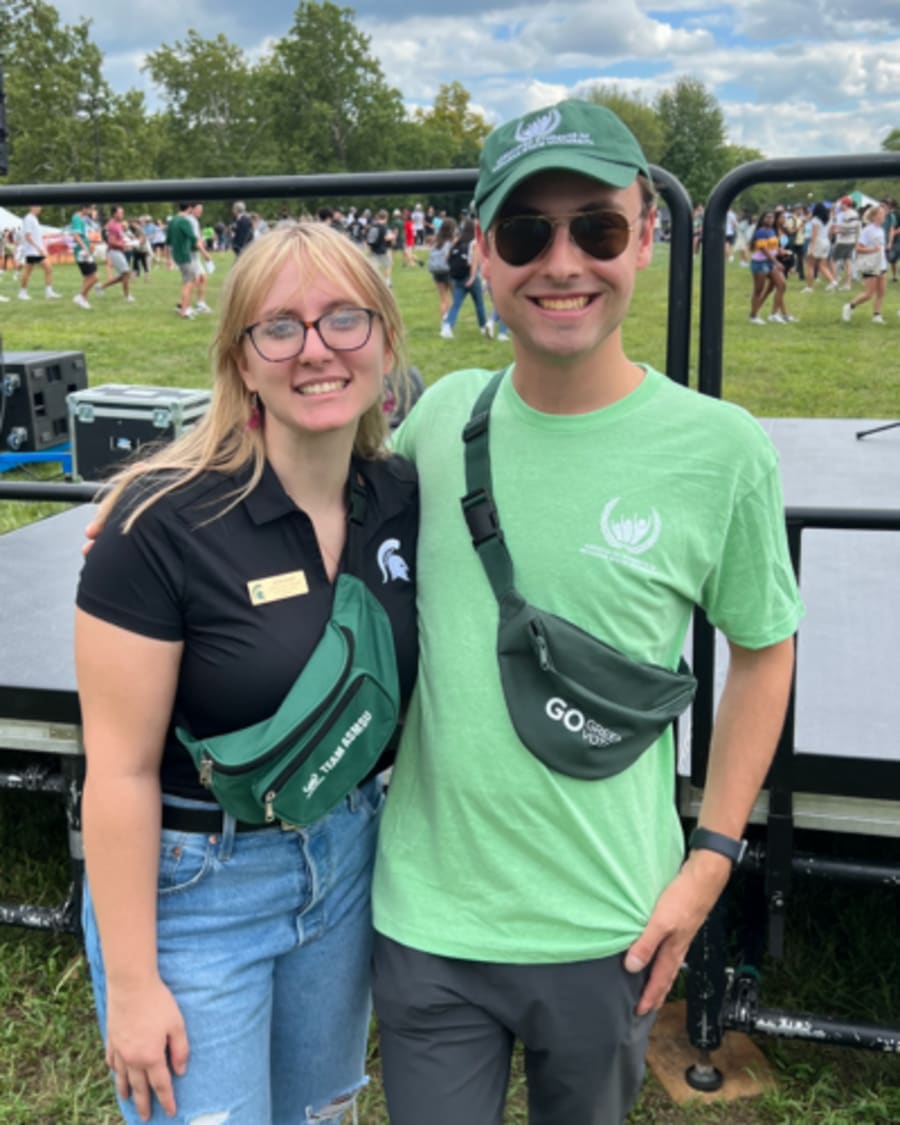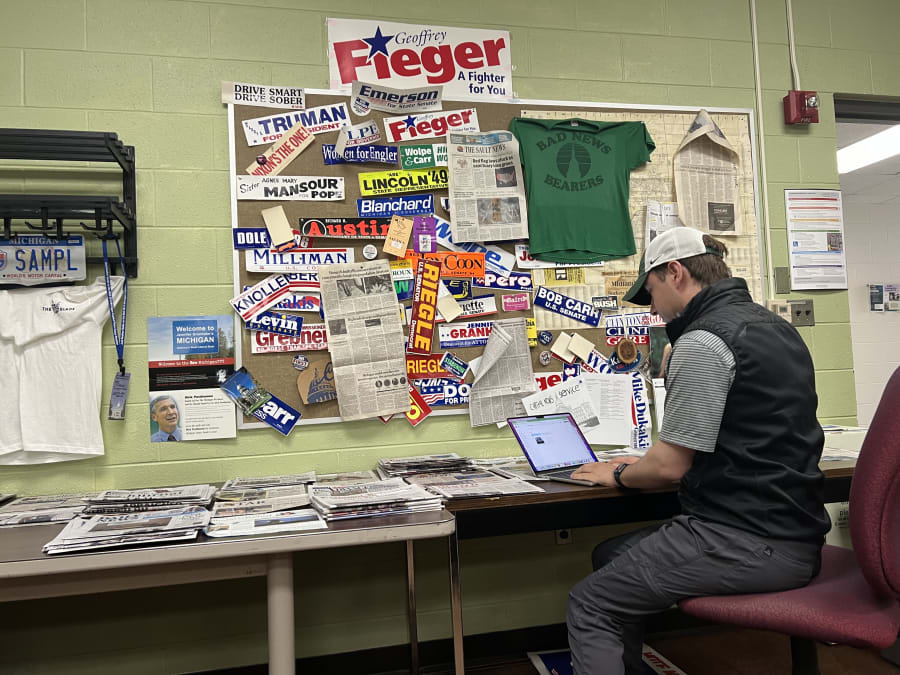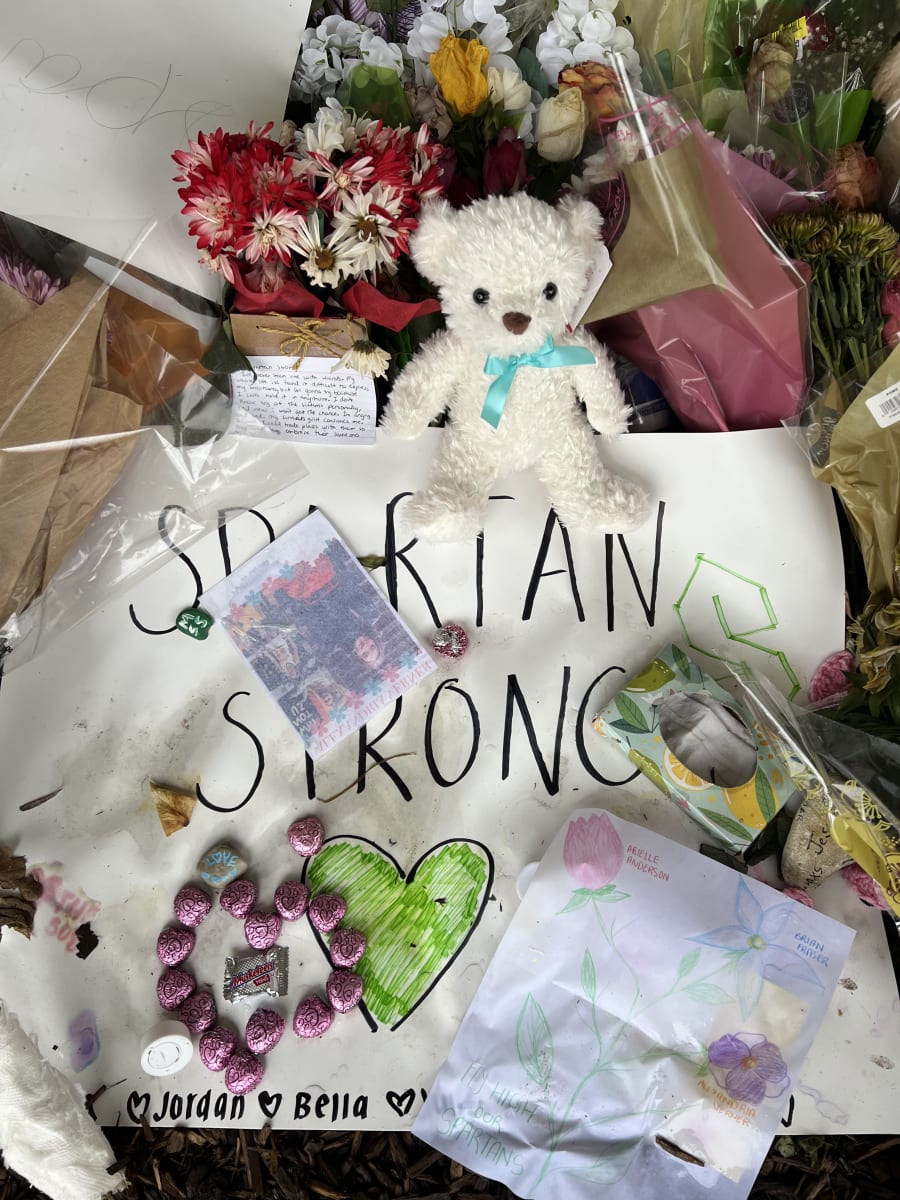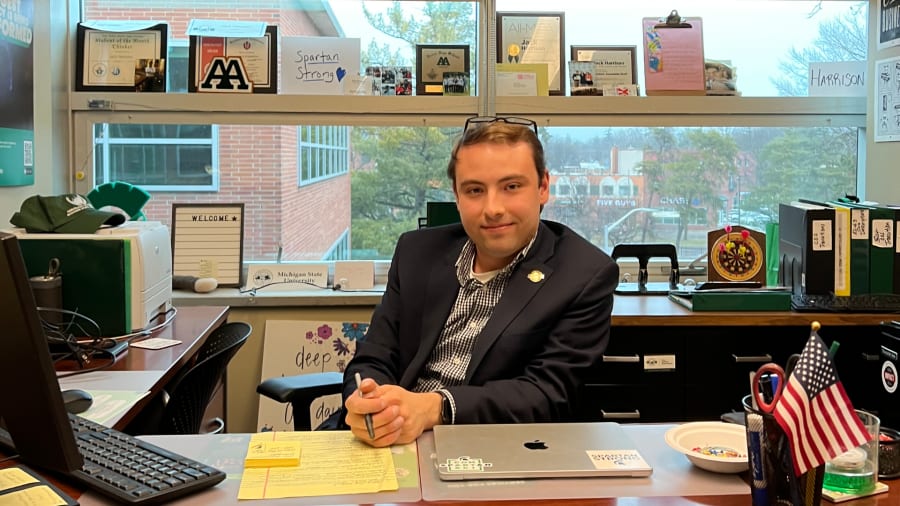EAST LANSING, Mich. – People often look back on their college years with a distinct longing -- perhaps for a simpler, more exciting time, or perhaps for that unmistakable sense of community fostered among old desks. As we age, it’s with a fondness that many of us reminisce about those challenging, transformative years that came to define our lives in one way or another.
While everyone’s college experience is unique, few have experienced such a distinctly unusual and complicated college career as Jack Harrison. Apart from the students who attended Michigan State University at the exact same time as Jack, few in this country can say their time in college was bookended by the disaster and tragedy of a global pandemic and a fatal mass shooting.
Jack’s time at MSU -- affixed with increasingly common gun-related affliction, and the even more common Spartan spirit -- offers a glimpse into a largely unfamiliar, but precisely modern college experience.
A Wolverine becomes a Spartan
Growing up as a University of Michigan fan in the city of Ann Arbor, Jack never saw himself becoming a Spartan. Even just before the fall 2019 semester began, the then-18-year-old questioned if moving to East Lansing was the right choice. But, enticed by the university’s programs, he made the commitment and moved an hour north.
Driven by a passion for politics, Jack enrolled in the university’s prestigious and residential James Madison College, which operates out of Case Hall -- an academic and residential building rolled into one. He was particularly excited to live and learn in the same building where his fellow classmates and professors would often be. (It didn’t hurt that Case Hall also had one of the best cafeterias on campus, speaking from experience.)
Jack also majored in journalism and minored in public relations through the College of Communication Arts.
August 2019 was like any other fall semester on campus: A hoard of freshmen moving into their dorms, wide-eyed while pushing around their giant, flimsy move-in carts. Among them, Jack found himself completely overwhelmed by the size of the vast, green campus and the opportunity it encased. After a few weeks, though, he settled in and began feeling less like a “Wolverine transplant.”
Most any Spartan will tell you that fall is the most exciting season on campus. The transition from lush summer tones to the ambers and golds of autumn is magical on grounds so rich with foliage -- and the transition to winter snow may be even more beautiful. Among all the trees, the fall sports season generates a lively energy and camaraderie that carries into nearly every corner of the city.
“I quickly understood why people love the campus, and, in a way, I felt the love from the campus itself,” Jack said.

But, one day in March 2020, the university that he finally began to view as home was asking him -- and everyone else -- to leave.
Pandemic shuts university down
“I’ll never forget sitting at the Panera at the Broad College of Business and getting a text alert about campuses closing and many operations immediately closing,” Jack said. “Students around me were also in awe, many shocked, some even excited at the prospect of campus being closed, not foreseeing when the next in-person class would occur.”
The COVID-19 outbreak had reached Michigan that spring, causing shutdowns statewide to prevent virus spread, including at universities. MSU quickly suspended in-person instruction and moved coursework online -- a sharp turn for MSU students, who take pride in and thrive on the campus community.
Students living on campus were advised to “return to their permanent place of residence.”
“Within days, my peers on my floor were moved out, and I said goodbye to friends,” Jack said. “It still did not feel real.”
After spending a few extra days on the freshly-emptied campus, the former Wolverine transplant found himself returning to Ann Arbor to be with family. He would spend some months there, uncertain of the future, as everyone was.
But he wasn’t ready to ditch his newfound fondness of Spartanhood. Not yet.
In the days before his classes moved online, Jack was campaigning to be a representative for the communications college in the Associated Students of Michigan State University student government organization. Though he was still new to the university and didn’t have the strongest connection to the school at that time, he said he still felt like a Spartan from afar -- and his work in student government certainly helped with that.
Through ASMSU, Jack said he was able to help “channel feelings of disappointment and uncertainty into actions to support students.”
Redefining ‘normal’
Jack moved to an off-campus apartment for his sophomore year in the fall of 2020, though classes were still virtual. It was a blow to the young college student who was eager to spend his second year living and learning among his James Madison peers.
“After thinking I would still be back in Case Hall my second year, that is when it really sank in that I would miss a year of sports, fun and the true Spartan experience,” Jack said.
Virtual instruction remained the norm on-and-off for years due to the pandemic, but that didn’t keep Jack from staying as close to campus as he could. He moved into an apartment at the edge of campus in 2021, and stayed there for the remainder of his college career.
Despite the mask and vaccine requirements in place reminding the students that things weren’t exactly “normal,” Jack said he was just glad to be back on campus.
“When I moved basically back on campus junior year, I felt this sense of relief and coming back to what I knew and what we deserved,” he said.
And things did become more normal after that: Classes eventually returned to in-person instruction, the mask mandates were lifted, and more and more people were up to their usual activities.

In addition to enjoying the many sports events at MSU, Jack continued working with student government, discovering a passion for the student community and student advocacy and leadership. He would go on to become the chief of staff for the ASMSU president during his fourth year -- a role, and year, that would be more challenging than pandemic woes could have prepared him for.
For the first semester of his final year, Jack and ASMSU focused on improving issues for their fellow classmates. Though the issues they tackled were certainly important, Jack said they paled in comparison to what came next.
Mass shooting shakes community
For people across the state of Michigan and the nation, Feb. 13 was a day of shock and grief. For MSU students and staff on and near campus when a gunman killed three people and injured five others, it was also a day of terror, panic and chaos.
That night, Jack was on campus in a sports and fitness building known as IM East when he received an alert announcing an active shooter in the area. Everyone on campus was told to shelter in place immediately. It wasn’t initially clear to the community where the gunman was or where the shootings occurred.
Then, at one point, it was falsely announced that the gunman was at IM East. Jack, and many others, fled the facility in fear, looking for a safe place to hide. It was later determined the shooter was never at that location, but those on campus didn’t know that at the time.
Jack took shelter in the basement of a friend’s house. He watched the events unfold on TV, feeling completely frozen. He then started to notice the text messages flooding his phone. Some of his friends thought he had been hurt, or worse, in the shooting.
He learned that the reports of a shooter at IM East were incorrect, and said he felt some relief. But the shock of it all remained: Eight of his fellow students were either killed or injured by a gunman who opened fire at two buildings on the north end of campus.
For Jack and many others, the terrifying events unfolded so quickly that night, it was hard to feel anything other than shocked at first.
“In the morning and the following days, it really sank in. I was most distraught about losing fellow Spartans, and we could not change that,” Jack said. “Taking walks around campus, I could see my classmates leaving flowers, on their knees at the statue and Rock, flanked by media cameras in the background.
“I volunteered at the vigil, and we saw so many people come out on that Wednesday. I still have the candle with Brian, Alexandria and Arielle’s names I wrote on there. I haven’t taken my SpartanStrong bands off, and I may never do so.”

The community came together in mourning, holding a vigil for the three students killed: Brian Fraser, 20; Alexandria Verner, 20; and Arielle Anderson, 19. After that day, Jack said many students went home, leaving the 5,200-acre campus feeling “somber, asleep and sad.” Classes were canceled for the week to help allow everyone to process what happened.
Unlike during the onset of the pandemic, when uncertainty was still mixed with lingering hope, Jack said the energy of the campus entirely disappeared with the students who left in the days following the shootings.
But Jack didn’t leave East Lansing. He felt obligated to be there and “keep some normalcy on campus,” especially because of his role in student government. With ASMSU, he quickly worked to help establish accommodations for his staff, and to help the community navigate through the tragedy, which included hosting events and providing resources for students and staff.
After nearly a week of doing all he could to assist the university in the aftermath of the shootings, he finally went home to rest for a day when the community returned to campus on Spartan Sunday. From then on, his efforts to provide support and promote change only strengthened.
Keeping the hope alive
There’s really no singular, correct way to process a traumatic event. It’s a process that looks different for everyone, and can last anywhere from weeks to decades.
It’s only been five months since the mass shooting at MSU, and the wound it created is still raw and visceral for so many -- something gun violence victims across the nation are all too familiar with. But the East Lansing community has moved forward in the weeks since, working to reclaim their campus and their lives.
Jack played a large role in guiding the campus community in a helpful direction after the shootings. He and his ASMSU colleagues worked tirelessly to secure accommodations for grieving students, including a credit-no credit grading system for the spring semester. After memorial items like flowers, signs, and stuffed animals sat in front of the shooting locations for a few weeks, Jack and his colleagues organized a collection effort to retrieve the items for preservation, ensuring those mementos of love and support had a permanent home.
Especially after February, there were many days when Jack and his colleagues would be at the office until midnight, working out ways to support the campus. Though it was a stressful position, Jack said that being so involved with the community, and really facing what happened head-on in a supportive role, helped him to process the shared tragedy.

Jack’s desire to make a difference didn’t end at the East Lansing border, however. He and his colleagues traveled to Washington, D.C. to talk with U.S. lawmakers about gun violence prevention in the wake of yet another mass school shooting.
" ... with America today, I was unfortunately not that surprised to know there was a possibility this could occur during my time living [at MSU],” Jack said.
“Only so many students have lived through a pandemic, but it was still a large amount ... only a handful have lived through shootings, yet more will, and that is what is difficult,” Jack said.
In the wake of the MSU shootings, state lawmakers were compelled to address the issue through legislation. Since then, several gun violence prevention and safety policies have been enacted in Michigan -- though experts say more laws are needed to make a real impact.
When it comes to the local community, Jack isn’t quite yet finished making an impact.
The now-22-year-old graduated in May with a degree in political theory and constitutional democracy from James Madison College, a degree in journalism, and a minor in public relations. Though he loves politics, given the experience he’s had in the last year, Jack is pursuing work in the communications field, specifically in higher education.
And, more specifically, at MSU. He’s starting a new role with the University Communications department this month.
With his time in East Lansing cut short by unforeseeable circumstances, he doesn’t feel quite ready to say goodbye to the community he’s fallen in love with. The last four years may have left him feeling angry and heartbroken, but they have also clarified his strengths, his passions, and his ties to Michigan State.
For Jack and many of his peers, the punctuation at the end of his college career is more of a question mark than it is a period. But, if anything is for certain, it’s this: He is undoubtedly as Spartan as they come.




